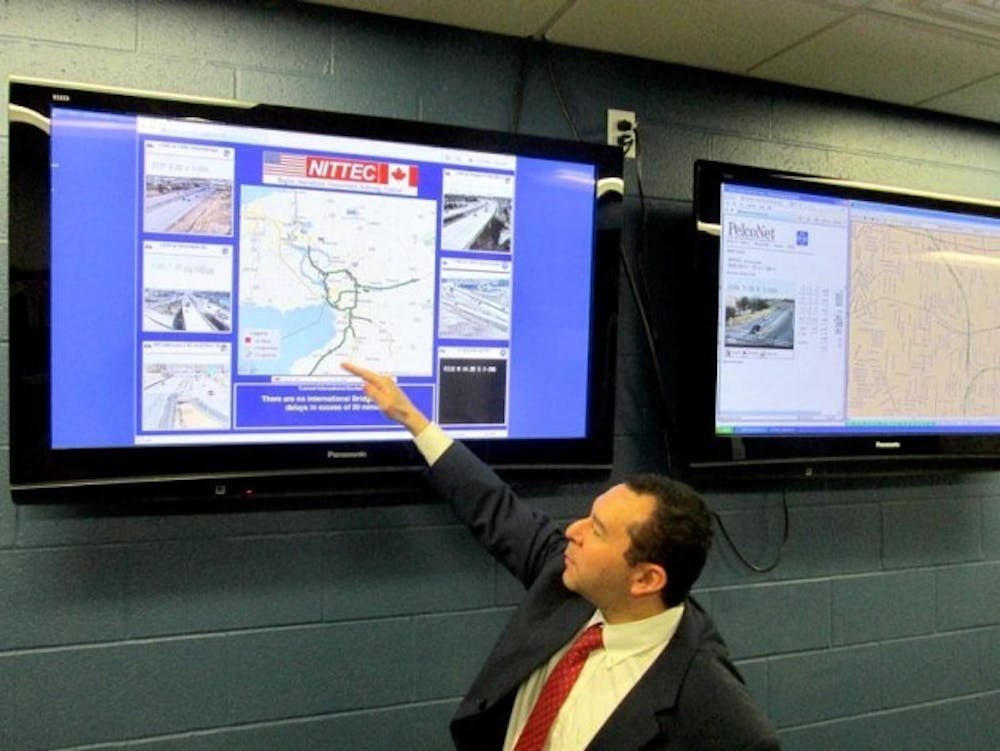Adel Sadek grew up in Alexandria, Egypt, and the pyramids and the ancient Egyptians always fascinated him.
This fascination influenced his decision to pursue civil engineering - the field where "you build stuff," he said.
In 1993, Sadek emigrated from Egypt to attend the University of Virginia for graduate school. Now, as a UB professor of civil engineering and the director of graduate studies for civil engineering, Sadek's focus has shifted to transportation. He won a grant and the Smarter Planet Faculty Innovation Award from IBM in 2011 as a result of his gathering of information on the fuel consumption, emissions and environmental cost resulting from the parking search process.
Sadek said every person spends at least one hour involved in transportation per day. He said improving the way people travel would improve the quality of life for all individuals. Traffic is a major problem in the United States - it costs the country almost $100 billion a year, according to Sadek.
His research aims to reduce the lost time, fuel, productivity and lives that come with congestion and accidents. He hopes one day to construct a self-driving orautonomous car - a "connected vehicle environment."
"We all have cell phones and there are wireless communications everywhere," Sadek said. "There are many communication systems and protocol and the idea would be in the future, cars would be able to talk to one another and talk to the infrastructure. So if a car is breaking, that information would be propagated immediately to the car behind."
He explained the advantage of this technology would be the response time. As humans, it takes the average driver one to two seconds to comprehend what's happening, which is why people are taught not to tailgate - to leave enough space and time to react to the situation.
If information is communicated automatically between cars, that will help improve safety because the car would react in a millisecond, Sadek said.
He also conducts experiments specifically affecting UB students and staff. One project examines what he calls the "parking search process," in which he studied parking behavior on campus.
Every driver has a preferred parking lot that is close to their destination, but drivers may go to an alternative parking lot farther away because there is a higher chance of finding a spot, according to Sadek.
He is also working on improving efficiency at the border between Canada and Buffalo. Over the summer or on a long weekend, people wait for hours at the border, Sadek said. So he is working with other engineers to construct a model that will help to predict the delay.
Sadek made the move from the University of Vermont to UB five years ago because UB's civil engineering department is ranked 24th nationally, while Vermont has a small engineering program.
Sadek also loves the opportunity to work with various faculty members in multiple departments.
"[Collaboration] is something that is very helpful because now when you have problems you cannot really solve them by yourself," Sadek said. "One discipline or one field cannot really address a problem in a holistic way. The interesting work comes when we have interdisciplinary teams, so people from different fields, different disciplines working together and trying to solve problems together."
Sadek works with people in various fields in his research and as a part of his role as the acting chair of strategic strength in extreme events - a part of the UB 2020 plan.
His department is looking at extreme events such as earthquakes, hurricanes, terrorist attacks, tornadoes, volcanoes and floods, trying to understand how to better prepare for them, mitigate their effects and respond and recover.
Sadek is working with people from the engineering department, the College of Arts and Sciences, geography, geology, the School of Management, the School of Medicine and Biomedical Sciences, nursing school and School of Social Work.
"We tried to bring people from different schools to approach a problem from a comprehensive view or holistic view," Sadek said. "So you have the different disciplines contributing their knowledge and being a part of the solution to a problem."
This semester Sadek is teaching a class called Traffic Operations and Design in which he teaches his students to looking at traffic engineering, how to design roads, how to model traffic on the roads, how to determine the capacity of a road and how to design a traffic signal.
Outside of UB, Sadek attends St. Mary and St. Moses Coptic Orthodox Church in North Tonawanda, N.Y., where he holds the position of youth leader.
As a youth leader, he helps run meetings every Friday at the church to hold Bible study and discuss various topics affecting the youth. He also coordinates community outreach like visiting nursing homes.
"The good thing is that these are things I enjoy," Sadek said. "I enjoy teaching. I enjoy doing research. I enjoy working with the youth at the church, so I can't complain."
Sadek advises Yunjie Zhao, a fourth-year Ph.D. student in civil engineering. Zhao echoes the professor's claims of loving to working with his students.
"Although being busy with meetings, researches and teaching, Dr. Sadek always manages to stop by at the transportation lab and talk with the students," Zhao wrote in an email. "He is not only an academic adviser but also a life mentor."
Zhao cherishes each and every single talk he can have with Sadek. He said every conversation is always fun and memorable.
Email: features@ubspectrum.com





